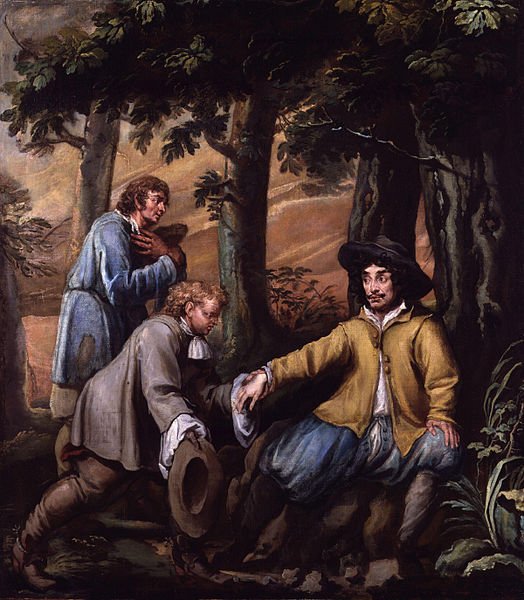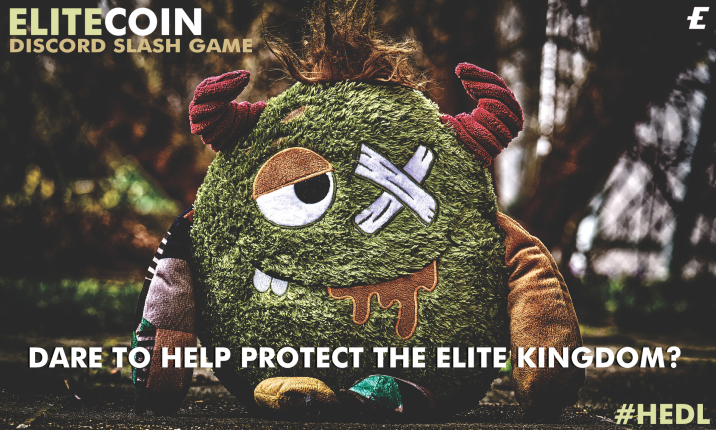Religion seems to always play a huge part in the conflicts of history. This is definitely true in British history whether it was the infamous Crusades, the persecution of the Puritans who eventually sailed to America or the repeated persecution of Catholics, it has always been a part of history.
King Charles I (a devout Catholic) was beheaded in 1649 to make way for Oliver Cromwell (a radical Puritan) and his Protectorate leading to a bloody Civil War and subsequent unrest.
The Civil War took place in three waves of war, the final of which concluded with King Charles II's defeat in the Battle of Worcester on the 3rd of September, 1651.

(King Charles II in Boscobel Wood by Isaac Fuller (d. 1672) - Source)
Charles fled with some of his most trusted men, and took refuge with a Catholic family. While there, he disguised himself as a woodsman, cut off his long hair and was tutored on how to walk and talk like a local. Though he was able to get the voice down, the walking was much harder, so they still needed a better way to hide Charles so that he could get to safety in exile.
Unable to stay longer (sympathizers faced execution if found helping the deposed King), Charles continued on his flight with assistance. However, plagued by fatigue, hunger and ill-fitting shoes, they had to come up with another plan, especially with Cromwell's troops still looking for him. All of the crossings of the River Severn were being watched by now.
Finally, on the 6th of September, Charles ended up hiding with another fugitive in the branches of a large pollarded oak tree at Boscobel House. (Pollarding was a practice of pruning branches almost all the way to the trunk of a tree, which then allowed for dense new growth...) This particular tree was large enough to hide several men and is where Charles was able to gain some much-needed rest while Major William Carlis (later Carlos) kept watch.
At the height of this, troops were searching literally beneath that very tree.
Fortunately for Charles, the troops eventually went on their way and after further adventures he was finally able to escape Britain in October and go into exile until he was able to regain the throne in 1660 - at which point the pollarded oak, now named Royal Oak, became a pilgrimage destination for Charles' followers.
To this day, the descendant of this tree is called the Royal Oak - inspiring many pubs and other locations to borrow the name. It is currently maintained by English Heritage and is open for tours.
Sources
Previous issues
Lori Svensen
author/designer at A'mara Books
photographer/graphic artist for Viking Visual
(Buy my work at RedBubble, TeePublic, PicFair and DeviantArt.)
verified author on Goodreads
(Buy my books at Books2Read and at LBRY)



Fascinating read about the role of religion in British history, particularly the struggles between Catholic and Puritan factions. However, it's crucial to recognize that these religious entities could only gain such influence through control over government structures. Government, in my view, operates much like a religion, wielding the monopoly of violence over a geographical area and thus enabling these factions to impose their dogma on others.
The lesson here isn't just about the dangers of religious extremism; it's about the fundamental risks of centralized power, regardless of whether that power is religious, political, or otherwise. This is why I'm a strong advocate for decentralization and open-source solutions. Technologies like blockchain and decentralized social platforms offer ways to dismantle the monopoly of power, giving individuals more control over their lives.
When we analyze historical conflicts through the lens of centralized vs. decentralized power, we start to see that the true battle isn't between religions or ideologies, but between individual freedom and institutional control. And that's a struggle that continues today, as relevant as ever.
Historically, humans were more tribal - which, I suspect, is the most natural form of "government" for our species. Maybe we'll go back to this way... hard to say, but it's definitely true that big government is no more or less corrupt as big religion.
In my experience, even Hive has big/small issues... the whales still do the circle-jerk around here, only throwing crumbs to the smaller accounts... while quality content is largely ignored unless you have the right friends.
Thanks for the visit!